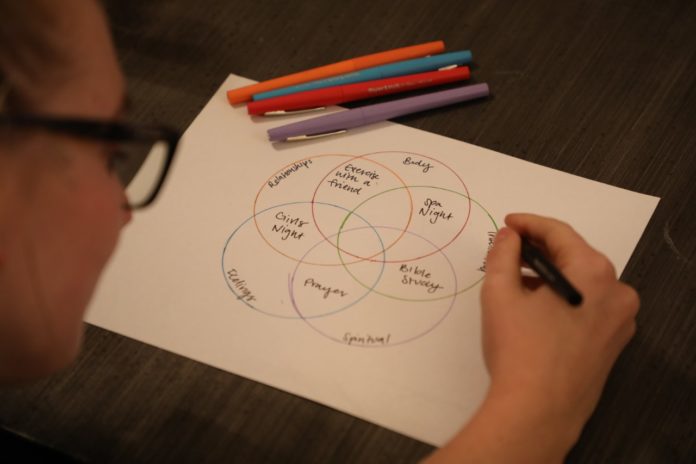
By Lexi Masarweh | Staff Writer
Regina Easley-Young — program manager for student outreach for the Center for Academic Success and Engagement — said family and health play a major part in students’ stress, especially in the past couple of semesters.
Easley-Young said when students do not use their time well, their stress goes up. In order to help ease that, she said she teaches strategic learning, which helps students develop skills for taking notes, completing assignments, preparing for tests and taking tests as well as strategies for accessing resources, managing time, dealing with stress and setting priorities.
Easley-Young said she often shows her students and others who need help dealing with stress a Venn diagram chart with five circles that overlap each other. The different circles are the physical (body), social (relationships), emotional (feelings), spiritual (inner life) and intellectual (thinking), showing that each of these aspects affect one another.
Easley-Young said one thing can affect another thing, but it is all about the choices made. If students are stressed in multiple aspects of their lives, sometimes they question their spiritual lives and why certain things are happening to them.
“When we didn’t do well on a test, just had a breakup and are having these feelings that we might start questioning, ‘Oh God, why did you bring me to Baylor?’” Easley-Young said. “When that might not be the question to ask, it might be, ‘When’s the last time I ate something good?’ ‘When’s the last time I exercised?’ ‘When’s the last time I had a talk with a friend?’ ‘Do I know someone who I can talk to about my feelings?’”
Easley-Young said she likes to think about managing stress in that way and to look at things very practically because we are not going to get out of having stress.
“It’s about balancing and the choices we make, not about getting rid of stress; we are not going to do that, none of us,” Easley-Young said. “But what choices am I making over the long-term — that could help, not prevent stress but manage it so it’s easier when those times do come up that could be stressful.”
Easley-Young said we can make time for activities that can relieve some of our stress by challenging our thinking.
“’Do I need to have a good walk today in this beautiful weather? Oh, well I am a little too stressed to do that. Well, 10 minutes?’” Easley-Young said. “So, when we are kind of challenged to think differently, well yeah I guess I can do that. And then afterward, check in and go, ‘Did that make a difference when I go to study?’”
Easley-Young said that it is important to turn off all social media apps and that she recommends the 10-minute rule and the 50-10-50 rule.
“Set your timer for 10 minutes — because we do anything for 10 minutes — and have something ready to really focus on,” Easley-Young said. “It could be a Quizlet, flashcards. It could be a list of something to memorize. It could be reviewing notes of a class you just came out of.”
Easley-Young said the 10-minute rule is that when the alarm goes off after 10 minutes, you can either study for another 10 minutes or stop.
Conversely, Easley-Young said the 50-10-50 rule is to study for 50 minutes, take a 10-minute break and then study for another 50 minutes. The break is essential because your brain can only focus for about 45 to 50 minutes.
Trish Baum, program manager for resources for the Center for Academic Success and Engagement, said it is important to have a plan when unexpected situations come up.
Baum said the Center for Academic Success and Engagement has a ‘preparing for finals’ packet that students can use to plan out their studying, which includes tips and strategies for finals.
Baum said it is essential to utilize the study days before finals and to wake up and start studying early. Another strategy she gave is for students to give their friends their passwords to their social media accounts and to have them change them until after they are done with their finals. Baum also said she recommends giving yourself a reward for a long day’s worth of studying and giving yourself a reward in the morning after you are done.
Baum and Easley-Young both said they recommend taking advantage of the Center for Academic Success and Engagement, which offers a variety of resources to help students, ranging from academic coaching to self-management. They said a tool that is useful is the learning lab, which offers free academic assistance.





